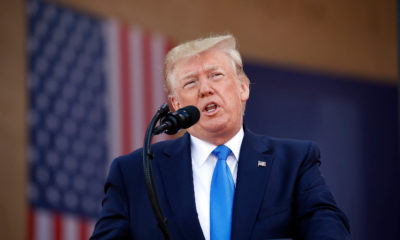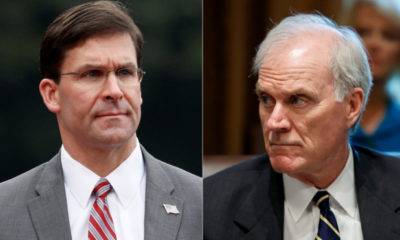World
Personal insult if black voters don’t back Clinton: Obama
 Washington : President Barack Obama urged the African-American community to help stop Donald Trump, saying he would consider it a “personal insult” to his legacy if black voters did not back Hillary Clinton.
Washington : President Barack Obama urged the African-American community to help stop Donald Trump, saying he would consider it a “personal insult” to his legacy if black voters did not back Hillary Clinton.
“If I hear anybody saying their vote does not matter, that it doesn’t matter who we elect — read up on your history. It matters. We’ve got to get people to vote,” Obama said on Saturday night while addressing the Congressional Black Caucus gala for the last time as president.
“I will consider it a personal insult — an insult to my legacy — if this community lets down its guard and fails to activate itself in this election. You want to give me a good sendoff? Go vote.”
The President warned that while his name would not be on the ballot in the November 8 elections, all of the progress that the country has made over the last eight years was on the line, CNN reported.
According to analysts, Obama’s Saturday night speech marked some of his harshest words yet about Republican presidential candidate Trump, as well as his most forceful call on the African-American community to support Democrat nominee Clinton.
Obama referred to the businessman as “somebody who has fought against civil rights and fought against equality and who has shown no regard for working people most of his life.”
During his address, he also made fun of the so-called “birther” (if Obama was born in the US) controversy, saying “There’s an extra spring in my step tonight. I don’t know about you guys, but I am so relieved that the whole ‘birther’ thing is over.”
“IS (Islamic State), North Korea, poverty, climate change — none of those things weighed on my mind like the validity of my birth certificate,” Obama added.
Speaking before the President, Clinton lauded Obama and also took on the birther controversy, CNN noted.
“Mr. President, not only do we know you are an American, you are a great American,” Clinton, who served as Obama’s secretary of state (2009-2013), added.
World
Lockdowns in China Force Urban Communities to Defy Censorship and Vent Frustration Online

Shanghai’s rich middle class is leading a wave of online dissent over the strict and prolonged lockdowns imposed in various parts of the country. Chinese internet censorship is struggling as patience is wearing thin in many urban centers, coming up with creative forms of online protests.
Social Media Posts Revealing Lockdown Tension in Shanghai
Drawn-out lockdowns are nothing new in China as authorities insist with the nation’s zero-Covid policy since the start of the pandemic. Currently over This time around, however, metropolitan areas like Shanghai are increasingly difficult to keep quiet, given that its more than 25 million residents have seen weeks of total isolation along with food shortages and many other service interruptions.
Dozens of towns and reportedly over 300 million Chinese citizens have been affected by lockdowns of different severity. As expected, urban netizens have been most outspoken over their difficulties by finding creative ways to get around state censorship and bans placed on topics, news comments and spontaneous campaigns.
Shanghai residents have been using mobile proxies and hijacking seemingly unrelated hashtags to talk about healthcare issues, delivery failures and the overall severity of their situation. The “positive energy” that the Chinese government wants to transmit during the recent prolonged series of lockdowns does not come naturally to those counting food supplies and online censors are working hard to filter words, trending topics and undesired social media sharing.
WeChat groups and message threads are under constant monitoring. Posts questioning the zero-Covid approach have been quickly deleted, including by leading Chinese health experts like Dr. Zhong Nanshan. Video footage is soon censored and protests and investigations are quickly made to disappear.
Where this has not worked, officials have exposed banners with warnings and outright threats like “watch your own mouth or face punishment”, while drones have been patrolling the city skies. Yet, if anything, this has led to further tensions and unspoken confrontation with Shanghai’s educated and affluent middle class.
Creative Online Solutions Harnessing Civic Energy
Announcements by Chinese social media that they would be publishing the IP addresses of users who “spread rumors” have not helped either. Tech industry research has shown that much of Asia’s tech-savvy population has a habit of using mobile proxies and other privacy tools, quickly finding workarounds to browse the internet freely and talk to the world about the hottest topics.
The sheer volume of forbidden posts is already a challenge for the very censorship system, experts explain. Unable to track all trending hashtags, state workers overlook topics that speak about the US, Ukraine or other popular news. Linking human rights elsewhere to their situation, Chinese online dissidents establish their informal channels and “hijack” the conversation to share personal or publicly relevant information about the Covid suppression in their town.
Sarcastic and satirical posts still dominate. Others hope to evade the censors by replacing words from famous poems or the national anthem. One thing is certain – social media, when harnessed with the right creativity, has proven its ability to mount pressure on the government in even some of the most strictly controlled tech environments like China.























